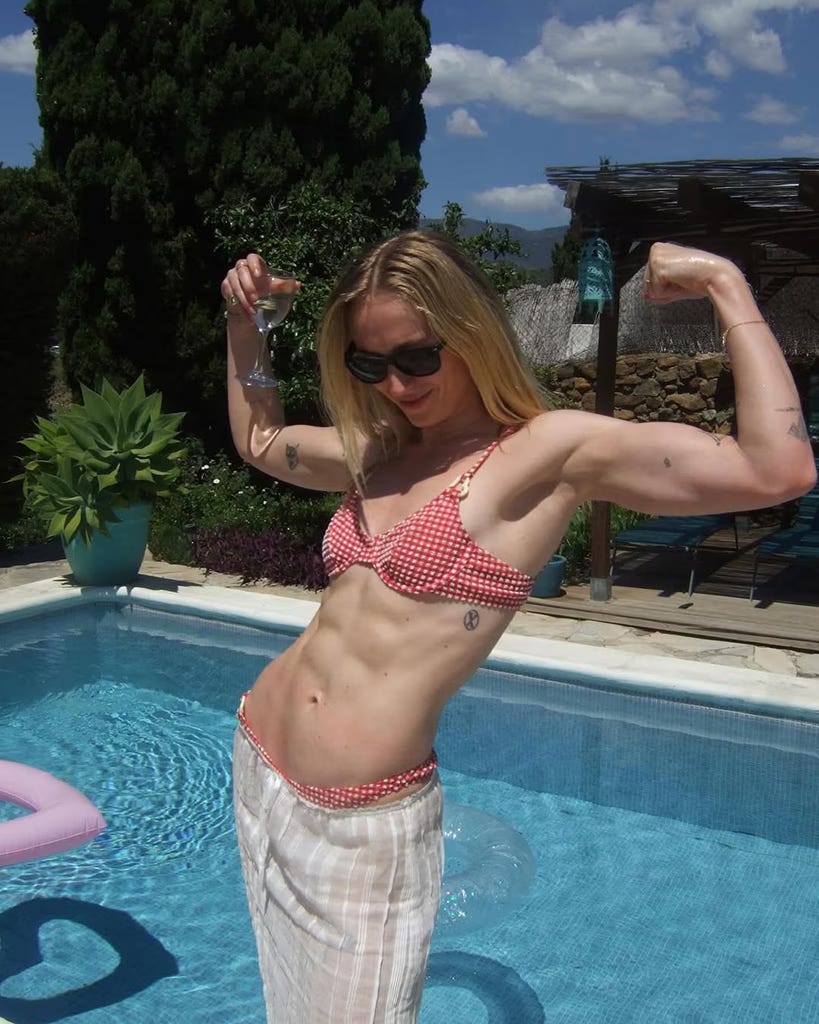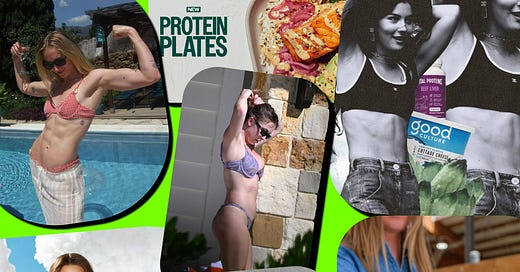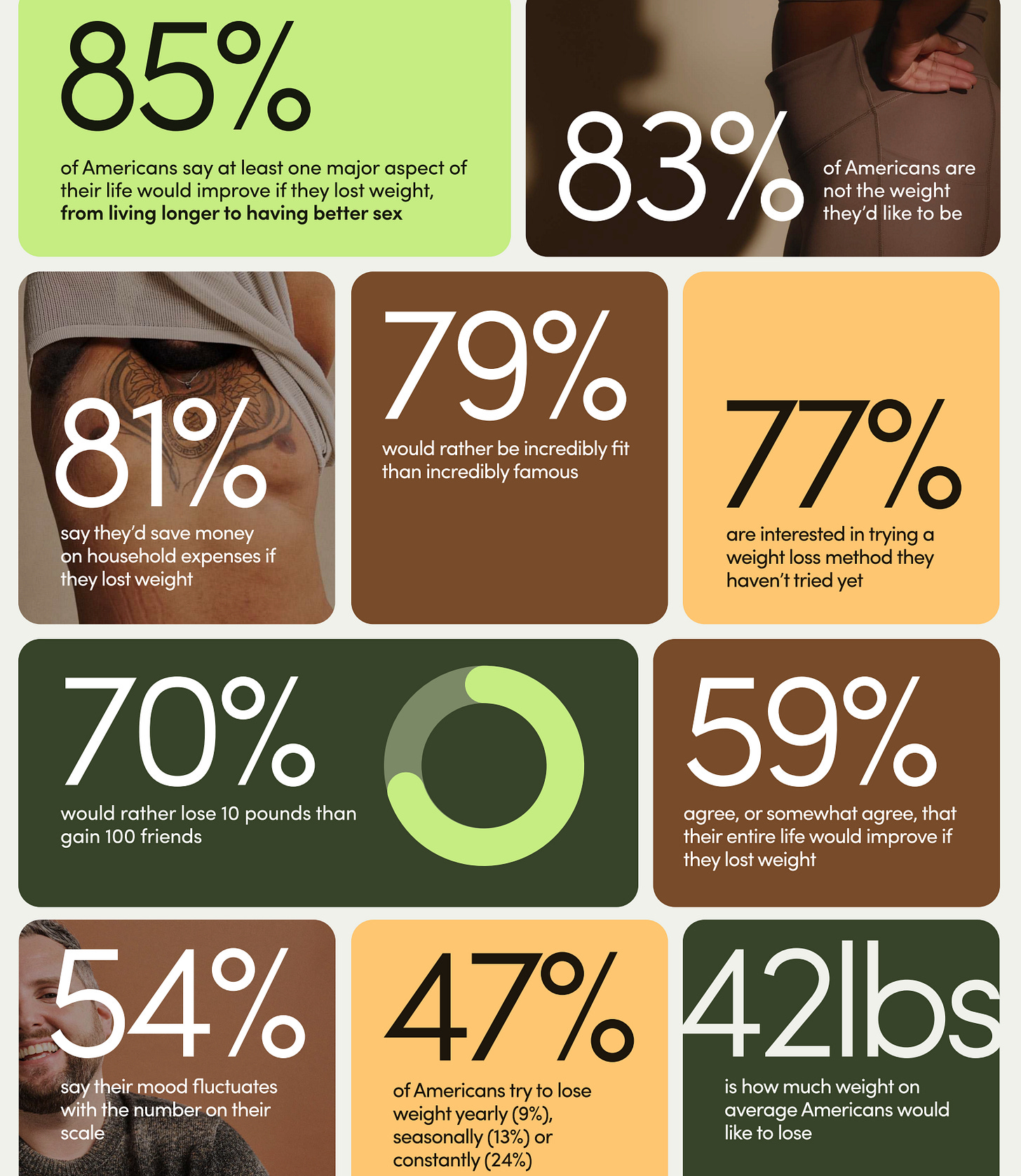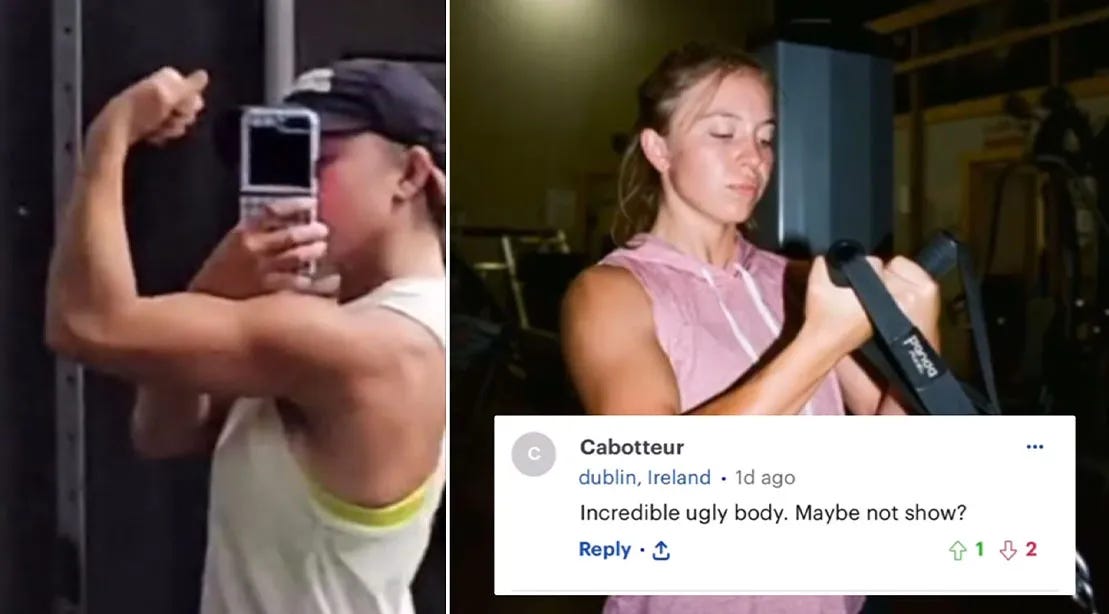I took precious time away from writing my book to (happily) write this for you. I also write helpful guides to feeling better in and about your body + body culture essays like this one that has almost 77,000 views. If you throw me $4.17/month for an annual subscription you’ll get access to everything and will support more of my kickass work. Please consider upgrading:
I spoke to and on their podcast The Review of Mess last week about how muscularity is having a moment and no one can shut up about protein (I come in around 1 hour, 6 minutes):
Emily asked me if and how this protein moment is any different from past diet fads like low-fat and keto. It’s different, I said, in that protein is a macronutrient and a building block of the human diet, so that the wellness world is encouraging people to eat more of it is a vibe shift from the Atkins Bar or Special K diet trends of yore. But, protein guidance is confusing and a lot of slop content online leads people to believe that they have to eat way more than they probably do. I wrote a no-nonsense, realistic guide to protein consumption myself:
Since more people, especially women, are getting into strength training than ever before, it stands to reason that we’d welcome protein to the wellness stage. I also said that the “yay muscle” moment has the potential to be more positive for women than only striving for a thigh gap or whatever we were doing circa 2004; if women are lifting weights regularly, they are also strengthening their bones, joints, and metabolic health, and reducing their cardiovascular mortality. A lot of women, myself included, are talking about how strength training is helping them overcome some of the disordered eating stuff in their past and feel mentally fantastic, too. Good stuff.
But protein and strength training are also having a moment because a lot of people just want to be less fat. I think we all kind of know that, but I hadn’t seen any real data until recently. Take a look at these stats from Hims & Hers 2024 report, “The Shape of America,” based on a survey of 5,000 U.S. adults:
I’m casting no aspersions on these desires or attitudes nor am I co-signing them, it just is what it is. When you live in a country in which 82 percent of people believe obesity is just as big a health threat as cancer — and that attitude has not changed since 2016 — you have the answer to the question Bustle recently asked in its article, “One Nation Under Protein”:
“Is this wellness obsession the basis of a healthy diet — or just another algorithm beloved fad?”
I’d argue it’s actually a not-so-secret third thing: It’s simply the latest iteration of Americans’ desire to be less fat than they are. Especially because eating more protein can help you build or hang onto the muscle that makes you a better fat-burning machine (this is what happened to me when I started strength training and experienced body recomposition), I personally think it’s a potentially less harmful wellness obsession than many others — better to eat more and move in such a way that any desired fat loss comes from concurrent metabolic effects rather than starving yourself insane, you know?
I think a lot of people, myself included, are into strength training for reasons that go beyond its potential to make you lean (though multiple things can be true; I like it for that reason, too). But when people search around for answers as to why young women in particular are hitting the weight room in droves right now, or why Sweetgreen is touting its protein bona fides all over the place, or why Khloe Kardashian and Hannah Neeleman have protein products1, or why the David protein bar just closed a $75 million Series A, it’s so obvious to me — not only is protein/strength training increasingly realized as an effective and efficient means of fat loss, it also conveniently offers people the chance to say it’s about something besides that.
Now, you can post a TikTok video saying you care about being “strong not skinny” while you’re tracking calories and working on your abs for summer. Sure, maybe you care about being strong, but you also still care about having lower body fat. A lot of people feel weird admitting that, so they cloak it in platitudes about strength and nourishment and power.
This is complex; I’m glad people, especially women, care about any of these things at all when maybe they didn’t used to, but I also know why more women are doing glute workouts and training abs but aren’t becoming competitive powerlifters. I think a lot of them care about being strong only as much as you can be that and still be considered hot and feminine by modern mainstream standards. I’m not knocking them for that, I get it. I just find any disingenuousness annoying, I guess.
Caring about that mainstream body standard is entirely unsurprising, though, given the way people react when women get more muscular and add body fat. I talked about this with Jessica and Emily, too: When Sophie Turner showed up on Instagram looking cut as hell recently, I heard nothing but praise (and I praised it too; this takes a ton of hard work):

But when Sydney Sweeney bulked up some to play boxer Christy Martin and appeared in paparazzi shots in a bikini, a bunch of freaks on the internet talked about her being a “catfish,” and ugly, and fat, and a bunch of other things that made me want to walk into the ocean.
The difference is that Sophie has very low body fat and Sydney had more2. Maybe it’s more socially acceptable to get jacked as a woman now than it was in, say, 2009, but you can only do that if you’re lean, too. That’s the attitude we’re all dealing with. God forbid you gain a couple of pounds of fat as you get strong enough to flip a tire or squat your body weight. God forbid you eat like a big beautiful horse.
All of this is merely an observation of something that’s always been true: Any modern body trend has always been about something and thinness or leanness — be curvy and have a small waist. Have a shapely ass and abs. Have “Pilates arms” and a willowy, ballerina frame. Now it’s about being muscular and lean.
It’s always been about fat. Eradicating it, managing it, combating it, moving it around to different places on the body, battling it with all manner of diets and supplements and exercises and shapewear and bullshit sold on TikTok Shop and by know-nothing influencers. I’m not immune, I never have been. As I look at myself in the mirror lately and see the layer of body fat covering my hard-won muscles that I wish wasn’t there, I wonder if I ever will be.
Sometimes I wonder if the current moment is the best we could reasonably hope for: A lot of people just want to get rid of some of their body fat, and in doing that they’re perhaps inadvertently becoming more physically robust, setting themselves up to age more healthfully, and discovering the kind of non-aesthetic benefits that strength training can bring about. Maybe some members of this generation of women will walk into gyms all over America primarily or only because they want the 2025 version of a bikini body but after a few months will see how when done right, strength training offers a host of returns that feel far more fulfilling and will last far longer than that.
Maybe the protein moment is fundamentally the same as every other diet fad. It’s about getting rid of something about ourselves we don’t like. I just have to wonder if this one has the potential, if we’re smart about it, to also be about finding something we do.
In no conceivable way was Sydney “fat,” but her body fat percentage in the pics was probably in the low 20s range, and Sophie’s is probably in the teens.











I am admittedly one of those who started lifting for vanity reasons (namely, because I'm in my 40s, and perimenopause does not give a fuck that i run consistently). The things I have always enjoyed, and that have also kept me relatively thin, are no longer effective. That said, I have not seen any visible difference yet but keep showing up because it feels great to be getting stronger, especially at my age.
I hate that I care about fat gain! But we have all been brainwashed, it seems. Also, it's frankly very frustrating when clothes stop fitting, and you don't know if you will just keep growing out of everything you invest in.
very grateful to have found your work recently. reading this piece is making me reflect on this inner battle going on in my head. I'm a runner, and I feel the strongest I've ever been. but over the years, my mile time has gotten slower and slower. I keep thinking, maybe if I were thinner, I could run faster.
but my goal isn't to run fast... it's to enjoy the run. to have the endurance. and I do. still, it's like a constant battle—these expectations to work harder, to be better, and the idea that being thinner might be the answer to it all.
still figuring it out, but reading this quieted the self-criticism. thank you.